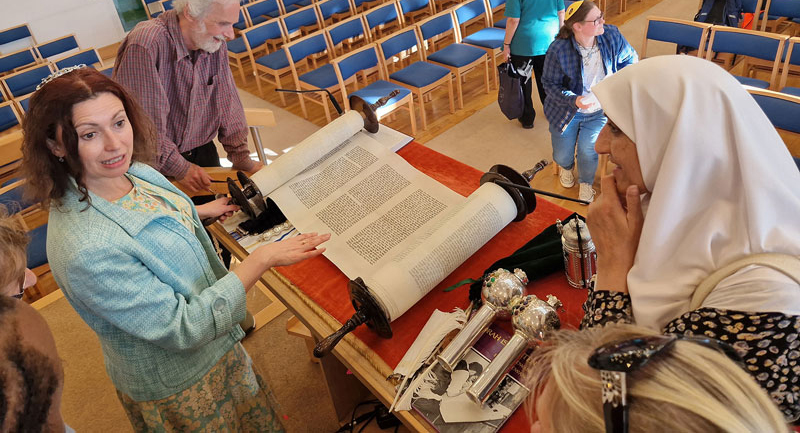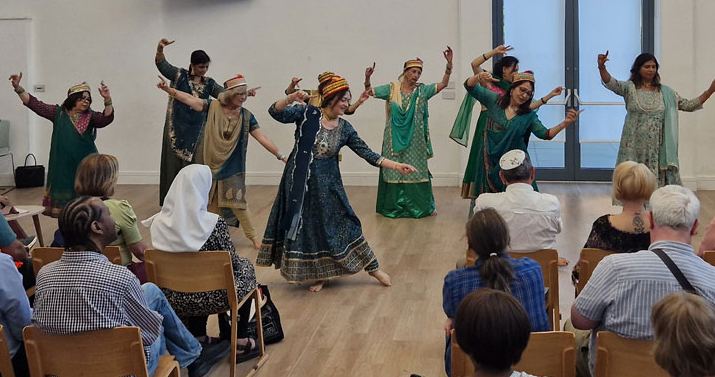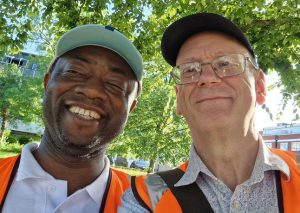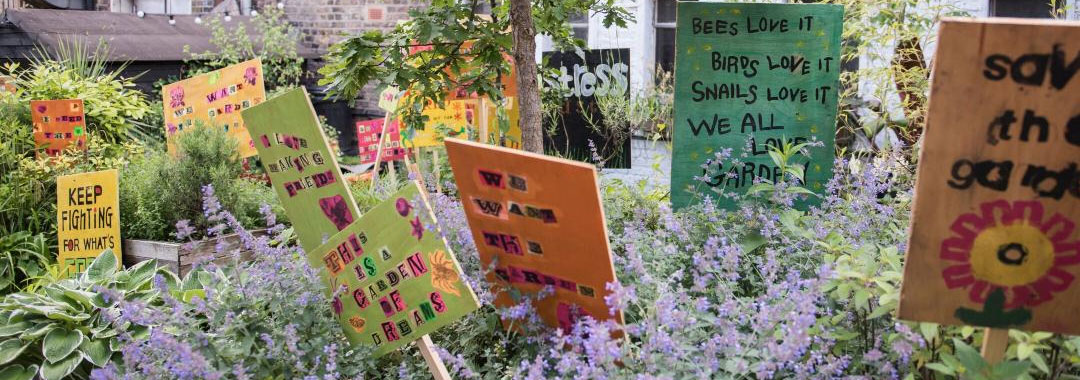Published in This Week at Woolf, 20 October 2024
Dear Woolf Friends,
Building upon the successful visit to the Woolf Institute in April 2024, organized by the Westminster Cathedral Interfaith Group, the Salaam Centre had the distinct pleasure of hosting an interfaith visit last Sunday 13 October. The event brought together diverse representatives from various faiths, religions, and traditions, embodying the true meaning of the Quranic term "Salaam" (Peace), which is most needed in our current troubled times.
 The Salaam Centre, currently under construction in North West London, is set to become a modern, eco-friendly, and sustainable place of worship. Developed and funded by the Shia Ithna Ashari Community of Middlesex (Mahfil Ali/SICM), it will serve as a community centre and beacon of hope and unity among diverse communities.
The Salaam Centre, currently under construction in North West London, is set to become a modern, eco-friendly, and sustainable place of worship. Developed and funded by the Shia Ithna Ashari Community of Middlesex (Mahfil Ali/SICM), it will serve as a community centre and beacon of hope and unity among diverse communities.
With a clear mission to encourage engagement and collaboration across all communities, the Salaam Centre aims to provide a platform for dialogue and understanding both within the Muslim community and with other faith groups. As a community centre, it warmly welcomes everyone while also serving as a place of worship for British Muslims.
Having recently completed phase two of its construction project, the Salaam Centre is now watertight and on track to finish internal work within the next 12 months. Once complete, the Centre will become a hub of knowledge, peace, and spirituality, serving future generations.
The architectural vision behind the Salaam Centre is the work of renowned architect Ali Mangera, who used to work with the late Zaha Hadid and is known for his innovative projects across Europe and beyond. Mangera has expertly combined traditional and modern sustainable elements, transforming the mosque into a 21st-century inclusive community center that reflects the needs and aspirations of today's society. The Centre will open its doors to all, offering facilities such as a sports hall, venue for community events, amphitheatre, library, and Multi-Faith Prayer Room.
The interfaith visit was graced by the presence of esteemed guests, including Dr Esther-Miriam Wagner, the director of the Woolf Institute, and Rick Sopher, the leader of the Bible and Quran reading group. As the visit coincided with the end of Yom Kippur, a significant occasion for Jewish people who fast for 25 hours, we had a talk and prayer for peace from Esmond Rosen, president of the Barnet Multi Faith Forum. Martin Weightman, director of the UK All Faith Network, also spoke about the upcoming interfaith week events in November. The visit was supported by the Westminster Cathedral Interfaith Group, and John Woodhouse, the group’s leader, presented a copy of Pope Francis' Laudato Si’ to the Salaam Centre to mark the occasion.
This gathering provided an excellent opportunity for networking and 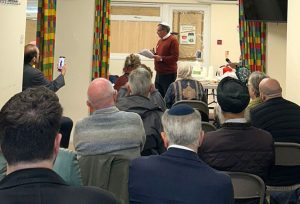 productive conversations about new ideas. We are hopeful that this visit will lead to fruitful relationships, meaningful dialogue, collaboration, and partnerships among various faith communities and other groups. We look forward to inviting all readers tofuture visits to the Salaam Centre upon its completion, where we can continue to build bridges and collaborate on further interfaith activities, in which the Woolf Institute plays a leading role.
productive conversations about new ideas. We are hopeful that this visit will lead to fruitful relationships, meaningful dialogue, collaboration, and partnerships among various faith communities and other groups. We look forward to inviting all readers tofuture visits to the Salaam Centre upon its completion, where we can continue to build bridges and collaborate on further interfaith activities, in which the Woolf Institute plays a leading role.
It is truly a blessing that we have in the United Kingdom the ability to connect with all faiths, traditions, and communities to understand, learn, and work together on important causes. These include combating religious-based violence and hate crimes, supporting social cohesion and diversity, and promoting partnerships for our planet, creation, and sustainability.
Best wishes,
Amir J. Ohadi
Member of Interfaith Committee at the Salaam Centre
Chair of the Environment and Sustainability Committee, BMFF




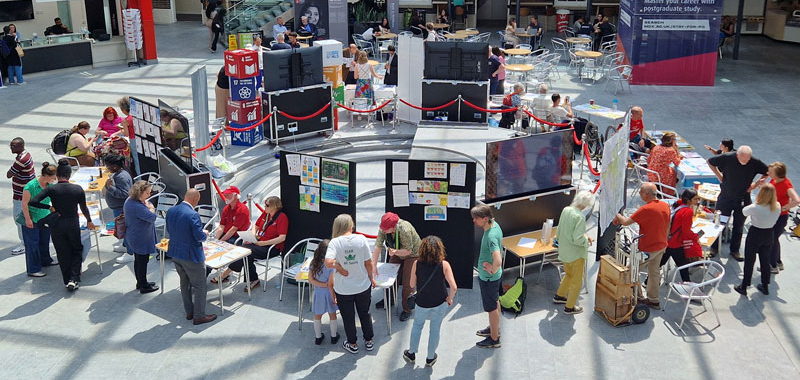
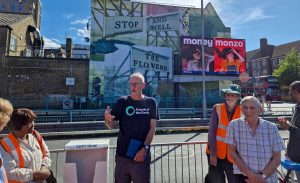
 The walk began at Edgware Methodist Church, a cornerstone of the community celebrating its centenary this year. The church, which has stood in its current form since 1956, serves a diverse congregation, including a significant number of West African members. Its role extends beyond traditional worship, hosting a large Romanian Pentecostal community and a Trefoil Guild group for former Girl Guide members. This rich blend of cultural and spiritual traditions reflects the church’s inclusive philosophy, making it a microcosm of the diversity that characterizes Edgware itself.
The walk began at Edgware Methodist Church, a cornerstone of the community celebrating its centenary this year. The church, which has stood in its current form since 1956, serves a diverse congregation, including a significant number of West African members. Its role extends beyond traditional worship, hosting a large Romanian Pentecostal community and a Trefoil Guild group for former Girl Guide members. This rich blend of cultural and spiritual traditions reflects the church’s inclusive philosophy, making it a microcosm of the diversity that characterizes Edgware itself.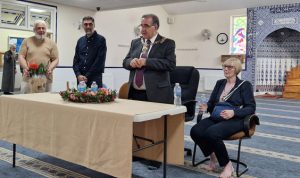 Participants then moved to the Islamic Centre Edgware, a vibrant and essential institution for the local Muslim community. Established in 1974, the centre has grown steadily over the years, culminating in the construction of a new, purpose-built mosque in 2016. This modern facility, located on Deansbrook Road, serves as both a place of worship and a model of environmental consciousness, designed with numerous eco-friendly features. The centre’s emphasis on environmental sustainability is deeply rooted in Islamic teachings, which encourage the faithful to care for the Earth as stewards of creation.
Participants then moved to the Islamic Centre Edgware, a vibrant and essential institution for the local Muslim community. Established in 1974, the centre has grown steadily over the years, culminating in the construction of a new, purpose-built mosque in 2016. This modern facility, located on Deansbrook Road, serves as both a place of worship and a model of environmental consciousness, designed with numerous eco-friendly features. The centre’s emphasis on environmental sustainability is deeply rooted in Islamic teachings, which encourage the faithful to care for the Earth as stewards of creation.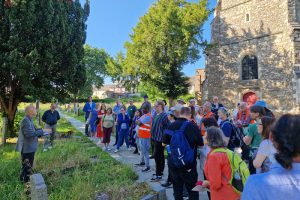 Next on the route was St Margaret’s Church and Community Churchyard, the oldest building in Edgware, with a history dating back to the 13th century. This historic church has been a continuous place of Christian worship and community service for over 700 years. The current structure, largely rebuilt in the 1760s, houses bells that were cast during that period and remain in regular use, following a significant restoration effort from 2012 to 2014. The churchyard, transformed in 2019 into a peaceful sanctuary amidst the hustle and bustle of Edgware’s main street, offers a quiet place for reflection and connection with the divine. Additionally, the historic almshouses associated with the church, dating back to 1680, provide a fascinating glimpse into the community’s long-standing commitment to social welfare.
Next on the route was St Margaret’s Church and Community Churchyard, the oldest building in Edgware, with a history dating back to the 13th century. This historic church has been a continuous place of Christian worship and community service for over 700 years. The current structure, largely rebuilt in the 1760s, houses bells that were cast during that period and remain in regular use, following a significant restoration effort from 2012 to 2014. The churchyard, transformed in 2019 into a peaceful sanctuary amidst the hustle and bustle of Edgware’s main street, offers a quiet place for reflection and connection with the divine. Additionally, the historic almshouses associated with the church, dating back to 1680, provide a fascinating glimpse into the community’s long-standing commitment to social welfare.